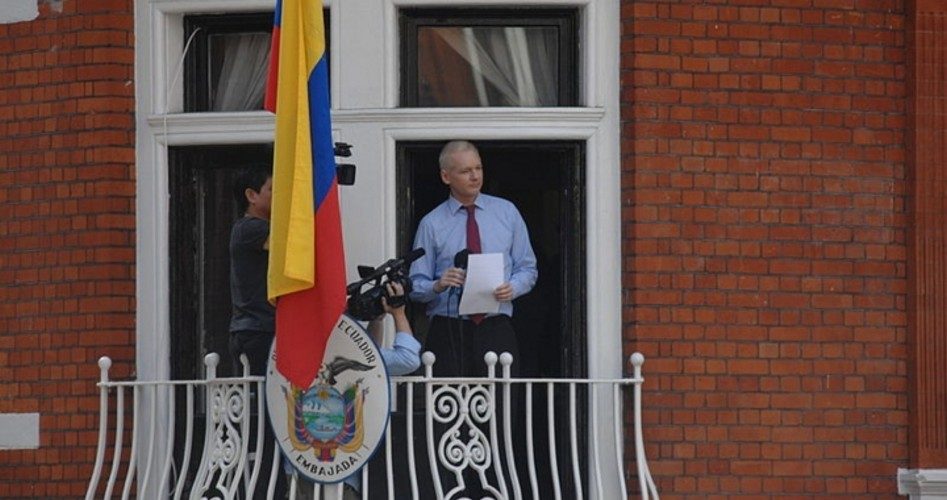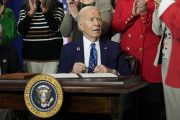
The Justice Department is leaning toward not charging WikiLeaks founder and editor Julian Assange for publishing the classified documents he received from PFC Bradley Manning, according to a report published by The Washington Post.
Citing unnamed “U.S. officials,” the Post claims that although a grand jury investigation of WikiLeaks “remains empaneled,” Attorney General Eric Holder is unlikely to pursue criminal prosecution of Assange unless new allegations against him crop up.
“The problem the department has always had in investigating Julian Assange is there is no way to prosecute him for publishing information without the same theory being applied to journalists. If you are not going to prosecute journalists for publishing classified information, which the department is not, then there is no way to prosecute Assange,” Matthew Miller, a former Justice Department spokesman, said, according to information in the Post article.
Assange poses a problem for the Obama administration, the Post reports. The anonymous officials described the situation as a “New York Times problem.” That is:
If the Justice Department indicted Assange, it would also have to prosecute the New York Times and other news organizations and writers who published classified material, including The Washington Post and Britain’s Guardian newspaper, according to the officials, who spoke on the condition of anonymity to discuss internal deliberations.
WikiLeaks, of course, is hesitant to rely on rumors of decisions not to prosecute Assange, until such time as a formal announcement is made. As the Post reports:
“We have repeatedly asked the Department of Justice to tell us what the status of the investigation was with respect to Mr. Assange,” said Barry J. Pollack, a Washington attorney for Assange. “They have declined to do so. They have not informed us in any way that they are closing the investigation or have made a decision not to bring charges against Mr. Assange. While we would certainly welcome that development, it should not have taken the Department of Justice several years to come to the conclusion that it should not be investigating journalists for publishing truthful information.”
For now, Assange, an Australian, remains a “guest” of the Ecuadorian embassy in London, where he lives in a hallway that has been converted into a bedroom. He has been holed up there since the South American country granted him asylum in June 2012. For its part, the British government dismissed Ecuador’s act to protect Assange, insisting that he remains a fugitive from justice.
“The United Kingdom does not recognize the principle of diplomatic asylum,” said British foreign secretary William Hague. Hague cited the Diplomatic and Consular Premises Act of 1987, claiming that Britain could legally revoke the Ecuador embassy’s diplomatic status. Hague also warned that Britain would not grant Assange safe passage out of the embassy.
A brief recap of the case against Assange and the role played by WikiLeaks in that matter is in order if one is to understand the numerous questionable actions taken by the governments of four nations (including the United States) that resulted in the arrest of Assange and the criminal charges he may yet face.
First thing, however — no matter what one may think of Julian Assange, WikiLeaks, or the information that has been released on that website — it must be recalled that Assange has been under arrest for nearly two years without being charged with any crime and without being brought before a magistrate to challenge his detention. This is the sort of denial of basic due process rights that the government of the United States should never demonstrate.
In late July 2010, WikiLeaks released the so-called Afghan War Diary. These documents are a collection of internal U.S. military logs of the war in Afghanistan.
It isn’t too much of a strain of credulity to believe that the United States would want to retaliate against Assange for the revelations contained in the Afghan War Diary, particularly those related to the aid given to the Taliban and al-Qaeda by our ersatz “ally” in the War on Terror — Pakistan, as well as the disclosure of the number of civilian casualties precipitated by the military action of the United States and other “coalition” forces.
In the days following the Afghan War Diary release, Julian Assange traveled to Sweden hoping to establish residency and to move the headquarters of WikiLeaks there in order to take advantage of that country’s liberal whistleblower laws.
While in Sweden, Julian Assange had consensual sex with two women in August 2010.
As for the two women, one of them invited Julian to speak in Sweden at a seminar about Afghanistan in mid-August 2010, while the other says she met Julian at a seminar and invited him home.
Importantly, both of these women have made sworn statements to the police in Sweden that their relations with Assange were consensual and non-violent.
In fact, discovery procedures revealed the existence of exculpatory evidence (chiefly text messages sent by the women to friends) that demonstrate that neither considered their encounter with Assange as anything other than consensual.
Later, after learning of each other’s existence, the two women apparently (as is evidenced by over 100 texts exchanged between the two of them) concocted a plan to make money by going to the press with a different account of their sexual relations with Assange.
The next day, after reviewing the file, Stockholm’s Chief Prosecutor Eva Finne dismissed the rape allegation.
“I consider there are no grounds for suspecting he has committed rape,” said Finne.
At this point, authorities began an inquiry into the possibility of charging Assange with the lesser crime of harassment.
Convinced of his innocence, on August 30, 2010, Julian Assange went to the police and offered to be questioned regarding the allegations of rape that were now being reprinted on many websites.
Despite assurances from the Swedish police that his interview would remain sealed, the next day the Swedish tabloid paper Expressen ran a story containing details of the interview.
As the case inexplicably continued, Swedish Left Party politician Claes Borgström was appointed as lawyer for both women.
It is curious to note that one month after the allegations against Assange surfaced, Borgström, then with the Social Democratic Party, stood for election on a platform of aggressively prosecuting and punishing those accused of sexual offenses.
After being assigned to the case, Borgström appealed the chief prosecutor’s decision to throw out the rape charges to another prosecutor, Marianne Ny.
Unfortunately, Assange was not informed about the appeal, and was thus denied the opportunity to respond to the reinstatement of the charges.
On September 1, 2010, Marianne Ny granted the appeal and reinstated the rape investigation against Assange, despite the obvious and unexplained denial of due process to the accused.
Julian Assange did not demonstrate the comportment of a guilty man, as he stayed in Sweden for five weeks in order to answer the serious charges against him that were once again being investigated. In fact, Assange made many attempts to arrange an interview with the prosecutor, but all offers were rejected and Assange was granted permission to leave Sweden to attend a previously arranged business meeting.
The rest of the story is succinctly recited in an article published by Business Insider:
On September 27, 2011 Ny ordered that Assange be arrested. Assange’s lawyers were informed on September 30, and by that time he had left Sweden. Ny stated that Assange “was ‘not a wanted man’ and would be able to attend an interview ‘discreetly’” despite the warrant for his arrest, according to the Agreed Statement of Facts.
In October and November Assange’s lawyers offered a telephone or video-link interview (because telephone or video interviews with suspects abroad are lawful in Sweden and qualify for the purposes of a preliminary investigation), but the options were denied as Ny insisted that Assange be interviewed in person.
After the U.K.’s Serious Organised Crime Agency (SOCA) denied the first EAW (European Arrest Warrant) because it “failed to specify the punishability in respect of each offence,” Ny submitted a replacement EAW on December 2. It was certified by SOCA on December 6; Assange was arrested on December 7 and has remained under house arrest throughout the arduous appeal process.
By a simple analysis of the Agreed Statement of Facts and Issues — without discussing the Swedish gender politics involved or how the media have treated Assange — it appears that Assange’s argument that the EAW is invalid should have persuaded the British judges that Marianne Ny was more of an “enthusiastic prosecutor than an impartial ‘judicial authority.’”
Beyond the legal proceeding facing him in Sweden, Assange could also be extradited from Sweden to the United States, where he could face serious charges of espionage or conspiracy regarding the disclosure by WikiLeaks of the Afghan War Diary and other caches of documents that reveal significant deception of the people on the part of the government of the United States, particularly in regard to the ongoing prosecution of illegal wars in Iraq and Afghanistan.
Ironically, it was a WikiLeaks disclosure made in February 2012 of e-mails from the Austin, Texas-based security firm Stratfor that reveal that an indictment was secretly handed down by the as yet still impaneled grand jury as early as January 26, 2011.
Although the Obama administration has yet to commit to a decision regarding the prosecution of Assange, there should be no doubt as to its commitment to fundamental principles of liberty.
Furthermore, regardless of one’s personal opinion of Julian Assange’s morality, there is no question that in every step of the case pending against him, Assange has been denied due process and the civil liberties that should be the right of all free people.
Photo of Julian Assange at the Ecuadorian Embassy in London in 2012
Joe A. Wolverton, II, J.D. is a correspondent for The New American and travels frequently nationwide speaking on topics of nullification, the NDAA, and the surveillance state. He is the host of The New American Review radio show that is simulcast on YouTube every Monday. Follow him on Twitter @TNAJoeWolverton and he can be reached at [email protected]



